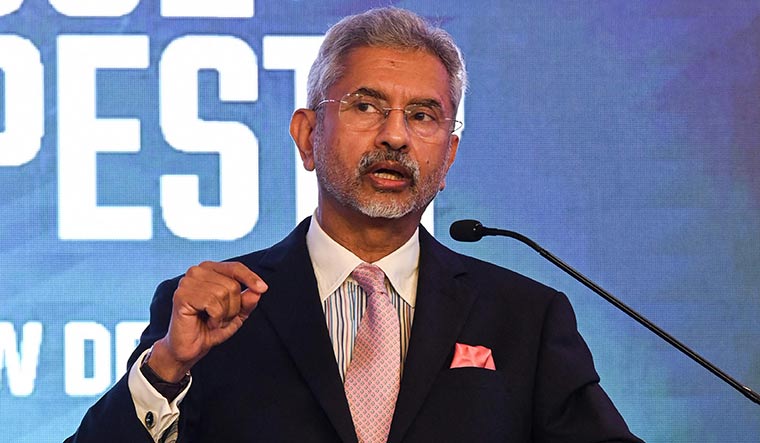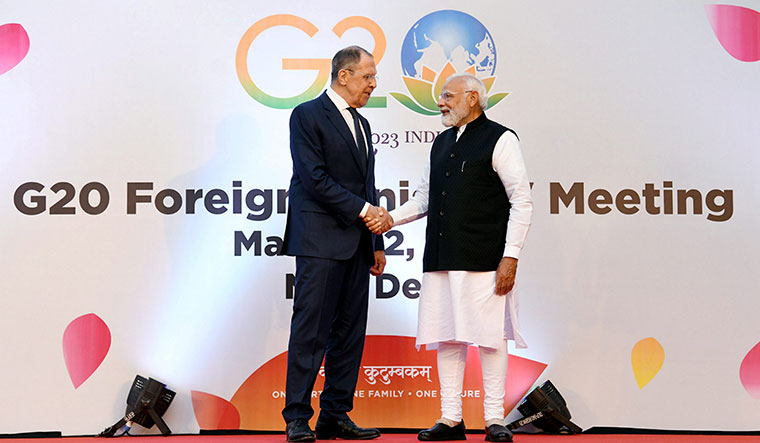On the morning of March 2, a bleary-eyed External Affairs Minister S. Jaishankar stood in the sunny forecourt of the Rashtrapati Bhavan to greet his counterparts attending the G20 foreign ministers meeting. It had been days of negotiations as Jaishankar and his team tried hard for a consensus. A week after the meeting of the finance ministers and central bank governors (FMCBG) of the G20, which failed to arrive at a joint communique, Jaishankar was hoping to find a middle ground on the Ukraine issue. The hurdle? An ally, Russia, and an arch rival, China. A consensus and a joint statement ultimately turned out to be elusive.
The foreign ministers met befittingly in a room filled with the photographs of India’s past presidents who had risen above partisan politics. Prime Minister Narendra Modi invoked Mahatma Gandhi in his video address, urging the top diplomats to overcome their differences. The consensus India helped hammer out at the G20 summit in Bali in November has frayed.
“It will be a tightrope walk for India,” said former ambassador Rakesh Sood. A few months after the Bali consensus, Russia has changed its position. “It is partly a reaction to NATO’s hardening stance, and it has hurt the prospects of peace. The Russians also expect more from Delhi as India is the host and a strategic partner,” said Sood.
The ‘war’ in the G20 is over the ‘war’ in Ukraine. Russia still calls the invasion a special military operation. The objections at the G20 have been based largely on two specific paragraphs in the joint statement―both of which were part of the Bali declaration. One described the different positions on the war. The other was about upholding the principles “enshrined in the United Nations charter’’ and Modi’s mantra that “today’s era must not be of war”.
The Russians, as a counter, wanted to include a paragraph on the Nord Stream pipeline bombing last year. Moscow views it as a terrorist attack, but the demand was rejected.
At the finance ministers’ and central bank governors’ meeting held on February 24 and 25 in Bengaluru, the divide over Ukraine was clear. Sources said there were passionate exchanges. As the G20 was set up in 1999 to deal with the global economic crisis, the failure to evolve a joint vision at a time when the world is recovering from the pandemic and is dealing with a major war is disastrous. With Russia and China objecting to the two controversial paragraphs, Finance Minister Nirmala Sitharaman was forced to issue a chair’s summary and outcome document. The failure to find common ground at Bengaluru was expected to be fixed in Delhi with the diplomats hoping that they could manage a joint statement. On the night of March 1―just after Delhi experienced its hottest February since 1901―there was an unexpected squall, almost indicating in a Shakespearean manner what lay ahead.
The next day, at a news conference held an hour before US Secretary of State Anthony Blinken was to address the media, Russian Foreign Minister Sergey Lavrov put the entire blame on the west. “Unfortunately, the joint declaration was not adopted because of the rhetoric of the west,’’ said Lavrov. The Bali declaration, in his view, was adopted by “ignoring’’ certain events. “It was clear that they were not going to implement the Minsk agreements [the 2014 agreements brokered by Germany, France and Russia to end the Donbas war],’’ said Lavrov, referring to a revelation by former German Chancellor Angela Merkel. In an interview with Die Zeit in December, Merkel said, “The 2014 Minsk agreement was an attempt to give Ukraine time. It used this time to become stronger as can be seen today.”
The finger pointing went both ways. Blinken chose to refer to China and Russia as “outliers’’. However, he agreed with Jaishankar who clarified that there was agreement on “95 per cent” of the issues. “What we have seen is the outcome document that reflects the shared agreements on many issues by all foreign ministers,’’ said Blinken.
 S. Jaishankar | AFP
S. Jaishankar | AFP
But the reason for the shift in the Russian stand possibly lies deeper. Things were stormy even during the Indonesian presidency last year. Ukraine was a special invitee to the event. “I think we should consider that Russia was never happy with the Bali declaration,’’ said Nivedita Kapoor, a scholar based in Russia. “Even though it highlighted the UN General Assembly resolution wherein countries like China and India abstained, it clearly called out Russia as the aggressor. I suspect that because China agreed to go along with the Bali statement, Russia realised that if it opposed the statement, it would be doing so alone.”
Kapoor said another factor which would have influenced Russia’s position was the presence of Chinese President Xi Jinping who had just secured his re-election and was on what was only his second foreign trip since 2020. Xi also had his first meeting with Joe Biden after he took over as president. It was seen as part of the efforts to ease Sino-American tensions. “A few months later, what changed is China’s willingness to come together with Russia. To my mind, this is a function of the ups and downs in the US-China relationship,” said Kapoor.
Any shift in the Sino-Russian dynamic, especially Moscow becoming more dependent on Beijing, is bad news for India. Kapoor said it could potentially impact the conduct of Russian foreign policy as an independent player. “This will be a function of Russian battlefield performance, its economic situation and the impact on its power projection in other geographies as it remains mired in a war. That is something India will have to focus on as it charts a future course for its partnership with Moscow,” she said.
With the conflict in its second year, positions are hardening in Russia. If Moscow chooses to adopt the Bali consensus, it might be viewed domestically as taking a step backward. And for the Russian forces, it will not be good for morale and image.
While the Bali statement did not name anyone, India chose to name both Russia and China as standing in the way of a consensus. Does this mean a pro-American tilt? The Russians might read it as so, especially as they increasingly view the world through an anti-western prism. Lavrov, for instance, was quite categorical in pointing out that the Quad was a western concept to contain Russia, and was clearly unhappy that the Quad foreign ministers conference was hosted by India close on the heels of the G20 summit.
The response to Lavrov’s criticism came from Japanese Foreign Minister Yoshimasa Hayashi who was unable to attend the G20 deliberations in person because of “scheduling issues’’, but was present for the Quad meeting. “This (the Quad) is kind of a band like The Beatles. The members are fixed and they always play together,” he said. “But this is more like a soft group… even within The Beatles, Paul McCartney can release an album solo.”
India may not have found the magic formula for solving the Ukraine issue. Modi will want to pull it off, to prove India’s heft on the world stage, with several world leaders asking India to mediate. Italian Prime Minister Giorgia Meloni, who was in India recently, was the latest to make the suggestion. “We will not reject any serious proposal [for peace],’’ said Lavrov when asked whether India could negotiate.
A fortnight of hectic diplomatic activity has shown how pivotal India has become on the global high table. Apart from the G20 and Quad meetings, there was Meloni’s visit, the Raisina Dialogue, the IBSA (India, Brazil, South Africa) meeting and the India-Europe conclave. It is also a reflection of how ambitions India has become. At Raisina, India displayed its ability to have a buffet of foreign policy options. There was a combative Lavrov, who defended Russia and announced that Russia, India and China would soon meet as part of the RIC troika. The Quad, meanwhile, made its position clear in measured tones. “India is playing with a smart strategy,’’ said Aleksei Zakharov, fellow at the Mumbai-based think tank Gateway House.
The coming months will be crucial. The future course of the Ukraine war will force India to make tough choices. “The Ukraine conflict will test the India-Russia relationship,’’ said Nandan Unnikrishnan, distinguished fellow at the Observer Research Foundation. If the situation does not improve drastically, things will be even more difficult in September when the G20 leaders arrive for the main summit. Zakharov hinted at the kind of challenge India is likely to face: “If President Putin attends the summit, he will be unwilling to face any sort of criticism.”


